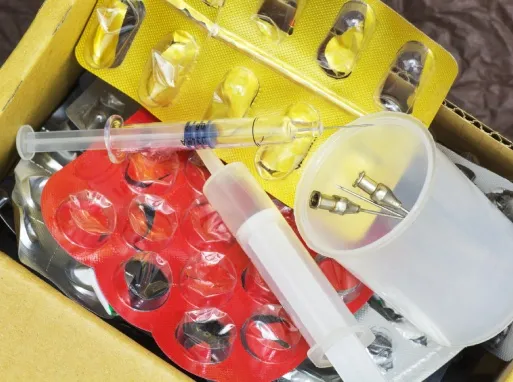Why Medical Waste Management Needs Urgent Attention

Healthcare waste management is a topic of growing importance across the world. The inappropriate management of the enormous amounts of waste generated by the healthcare industry poses risks to humans, animals, and ecological health. Used needles, body parts, syringes, soiled dressings, blood, diagnostic samples, chemicals, pharmaceuticals, medical devices, and radioactive materials are only a few examples of the wide variety of things that make up medical waste, as defined by the World Health Organisation (WHO). As the world’s population rises and the amount of available land for dumping medical waste decreases, improper waste management in hospitals and other healthcare facilities has become an urgent problem worldwide.
Growing Urgency for Secure Disposal of Medical Waste
Protecting healthcare workers, patients, and the community at large and the local environment is possible via the careful and responsible handling of medical waste.
Improper medical waste management may lead to improper waste segregation, storage, transportation, and disposal. Which can pose threats to both the environment and industry.
Therefore, a solid waste management strategy for healthcare waste must be put into place immediately. The process of establishing a reliable medical waste management system is complex. It requires an analysis of waste and an evaluation of current practises. A review of all potential waste management approaches, the creation of a waste management strategy, the announcement of government regulations and guidelines, the establishment of a waste management association, the allocation of human and financial resources, the implementation of procedures within predetermined time frames, and the creation of a training and education programme to deal with regular training, evaluation, monitoring, and updates.
Different Types of Waste Categories
Healthcare waste is generated through providing and receiving health care services in institutional and community settings and must be categorised to be managed effectively. The disposal of healthcare waste requires categorization according to the nature and origin of the waste’s potential danger. The healthcare sector generates two types of waste: hazardous and non-hazardous.
Infectious Waste
Any waste that poses a danger of infection, either now or in the future, is considered infectious waste. In this sense, even mild diseases may be contagious. Similarly to other infectious waste, any implanted medical equipment that has come into touch with infected bodily fluids must be treated as hazardous. All health care waste, whether it was produced in a hospital. A community setting, or elsewhere, is assumed to be contagious unless proven otherwise.
If infectious waste is not isolated from other types of waste, the whole waste collection must be labelled as infectious waste and sent for the necessary treatment and recovery, or it must be thrown away.
Pharmaceutical Waste
Medicinal waste includes pharmaceutical products, prescriptions, vaccinations, and expired and contaminated medicines. It also includes discard items that have gotten taint from their previous use in the pharmaceutical industry. Products like masks, tubes, syringe bodies, prescription vials, and empty containers with residues on them fall under this category.
Cytotoxic and cytostatic medications are the only ones that need to be store in a separate area from other medications since they are considere hazardous waste.
All pharmaceutical waste, including those use for cytology, will have to be incinerate if they are not segregate beforehand.
Any non-cytotoxic pharmaceuticals that may contain harmful ingredients (such as prohibited chemicals, for example) should be turn over to the appropriate authorised personnel for destruction.
Offensive Waste
This is a made-up term for waste that isn’t toxic or infectious and hence doesn’t require special handling during offensive waste disposal but might nevertheless be objectionable to those who come into contact with it. This group includes both “sanpro” waste and what was originally call “personal hygiene waste.”
Use of Colour-Coded Bins for Easier Organisation
Moreover, the specialised containers for clinical waste come with coloured lids that call attention to the particular kind of waste you’ve chosen to dispose of. Waste of a general or home nature goes in the black bins, whereas waste that might be objectionable goes in the yellow bins with a black stripe. These two kinds of waste end up in landfills. Waste containing infectious organisms is mark with an orange colour code, waste containing hazardous materials with a yellow colour code, and cytotoxic waste with a violet colour code. Incineration is the correct method of disposal for each of these waste categories.
The Features of a Trustworthy Waste Removal Service
Transparent Pricing: No Hidden Fees
You need to know exactly how much help you’ll get and how much it’ll cost you. Down to the smallest detail. A medical waste service supplier should always be happy to answer your questions.
Consistent Success
It is important to choose a company that has a history of success in the sector of clinical waste collection. Do they adhere to the industry’s most current standards and have official authorization? Consider the feedback of other buyers and act accordingly. To what extent, for instance, do their claims have some kind of proof, such as customer reviews?
Expertise in Handling Medical Waste
Do they provide advice and suggestions on how to best keep your waste under control? Do they provide you with the requisite specialised equipment to grade waste in line with their specifications? Is there a chance that they don’t know about the law? Even though you ultimately must make sure everything is in order. Do they advise you of any changes or recommendations you should be on the lookout for? In most cases, it is preferable to work with a medical waste management firm that is willing to answer questions and provide recommendations.
Specialised Waste Collection
Will the organisation’s collection schedule be adaptable enough to meet your demands. Or will it be set in stone to suit theirs? Something is wrong if your service provider says they can only visit once a week even though you need everyday pickup.
When it comes to medical sharps disposal and collections. A reliable provider should be able to accommodate your needs regardless of the frequency with which you need pickups.
Get in contact with Trikon Clinical Waste right now for comprehensive clinical waste management services. Experts in your area may take care of your waste on a daily, weekly, or monthly basis.




